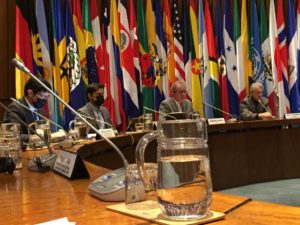
As part of sharing the research findings and information gathered through project, “Inclusive and sustainable smart cities in the framework of the 2030 Agenda for Sustainable Development”, an event was jointly organised by the Economic Community of Latin America and the Caribbean (ECLAC) of the United Nations , the German Institute of Development and Sustainability (IDOS) and Deutsche Gesellschaft für Internationale Zusammenarbeit (GIZ). The hybrid event, named “Sustainable urban mobility: An interregional dialogue on the industry and financing of public transport”, took place in Santiago, Chile, on May 24 and 25, 2022. This dialogue had the participation of national and subnational governments, industry players, the Academia and other persons interested in public transportation and mobility.
ECLAC has proposed the Big Push for Sustainability as a framework for the region. The Big Push for Sustainability recommends an ambitious public policy to accelerate a structural change that reduces the environmental footprint of the economy, maintains and recuperates the productive capacity of natural capital, and, at the same time, generates economic growth, employment and other social benefits. These ideas have been applied to urban mobility reforms in the form of practical implementation processes in a variety of urban agglomerations in order to derive practical roadmaps toward sustainable urban transport that are socially acceptable, economically relevant and politically feasible.
To achieve climate change goals in transportion, the sector has to transition from fossil fuel-based to renewable energy, with co-benefits. ECLAC partnered with IDOS, the Observer Research Foundation (ORF) of India and GIZ to conduct in-depth case studies of sustainable public transport experiences in Asian and Latin American megacitiesand identify policy lessons. The project and the event were sponsored by the German Federal Ministry for Economic Cooperation and Development (BMZ) through the GIZ.
Day one of the event focused on industrial policies aimed to exploit co-benefits of the roll-out of pubic transport in two cases: the adoption of electric buses and the construction of urban rail networks. From the IDOS side, examples of how Chinese and Indian cities have developed local capabilities for electric buses and metro rail were shared in partnership with the ORF.
The second day was devoted to how cities can mobilise resources to finance sustainable urban transport systems. ECLAC exposed the different challenges for the financing of sustainable mobility in LAC and opportunities for land value capture. IDOS, ORF and World Resources Institute (WRI) provided insights from Asian cities for the financing of urban rail through land value capture and transit-oriented development mechanisms. The dialogue ended with conclusions drawn by Jose Luis Samaniego (ECLAC) and Tilman Altenburg (IDOS).
More on the event, including the presentations, can be found here: https://www.cepal.org/es/eventos/movilidad-urbana-sostenible-un-dialogo-interregional-la-industria-financiamiento-transporte

Schreibe einen Kommentar